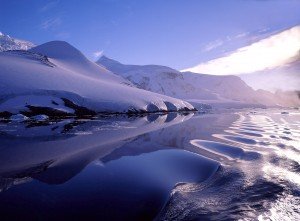Efforts to reach an international agreement establishing a Marine Protected Area in Antarctica’s Ross Sea have failed for the third time in a row.
 The proposal to create Marine Protected Area (MPA) was a key focus of the annual meeting of the Commission on the Conservation of Antarctic Marine Living Resources (CCAMLR) taking place in Hobart this week.
The proposal to create Marine Protected Area (MPA) was a key focus of the annual meeting of the Commission on the Conservation of Antarctic Marine Living Resources (CCAMLR) taking place in Hobart this week.
Agreement on Antarctic MPA proposals had been sought at two previous meetings, but the requirement for full consensus between delegates from all 25 nations represented at CCAMLR has never been met. At the latest meeting a joint bid between the US and New Zealand presented the Commission with revised proposal.
However according to media reports, Russia, China and the Ukraine blocked final agreement on the proposal.
Read more from Radio New Zealand, the New Zealand Herald and Stuff.co.nz.
The SMC collected the following expert commentary. Feel free to use these quotes in your reporting. If you would like to contact a New Zealand expert, please contact the SMC (04 499 5476; smc@sciencemediacentre.co.nz).
Associate Professor Clive Evans, University of Auckland, comments:
“The failure of CCAMLR to reach consensus on a significantly watered-down proposal from New Zealand and the USA for a Marine Protected Area (MPA) in the Ross Sea is a victory for political gamesmanship and a slap on the other cheek for NZ, the USA and indeed CCAMLR itself from components of its body corporate.
“One wonders just how much further the original proposal will need to be diluted to gain the necessary support of all CCAMLR members should yet another modified version go forward for a fourth reading in 2014.
“Key issues appear to centre around the failure of certain countries to recognize the long term ecological value of conservation measures vis a vis immediate commercial gain, and the significance of the science that underpins the current proposal. These matters won’t be resolved on a whim.
“If some meaningful measure of protection for the Ross Sea is to be attained in 2014 without a significant loss of fishing restrictions as to make the entire proposal risible, other members of CCAMLR are going to have to do more than just lobby hard in the interim. Clearly the conservation message just isn’t getting across.
“The Ross Sea ecosystem may now take a small step backward while CCAMLR plays the metaphorical fiddle, but it won’t collapse….at least not yet. There is still time to protect this unique marine ecosystem and it behoves all conservation-spirited members of CCAMLR to ensure that the fourth time really is lucky. Science continues to do its part. It’s the politicians that now need to do theirs.”
Dr Victoria Metcalf, Lecturer in Animal Genetics, Lincoln University, comments:
“The failure for the third time to reach consensus of MPA’s in Antarctic waters is both saddening and troubling, but perhaps not unsurprising. Whilst this is often proclaimed as a matter under discussion based solely on science, it is clear that there are many nuances resulting from political and cultural values that may be the real deciding factors.
“There was more anticipation this time of a successful outcome with a reduced MPA proposal, but this is a reminder that the outcomes of science don’t operate in a vacuum and that consideration of both the science:policy nexus and the interaction between cultural values and science are indeed pivotal.
“Negotiations between such a large number of countries and with such diverse beliefs regarding treatment of the oceans and marine biota are incredibly complex and perhaps it is a case of being patient for these MPA’s to hopefully eventuate in some form.
“However, in the meantime what about the marine biota in question? The cumulative impacts of fishing, climate change and ocean acidification continue to march on and there is no halt in their progression whilst talks stall again. In particular, recent studies on the effects of ocean acidification have shown that the calcium carbonate will reach non optimal levels much sooner in Antarctic water than previously thought, just decades away. Thus, every year that there is added pressure from fisheries on these regions will in turn amplify the effects of other environmental variables such as ocean acidification on Antarctic marine ecosystems. As Antarctic marine biologists we should be pushing for more science to be conducted to look at multifactorial impacts and these in turn need to be considered in future CCAMLR discussions.”